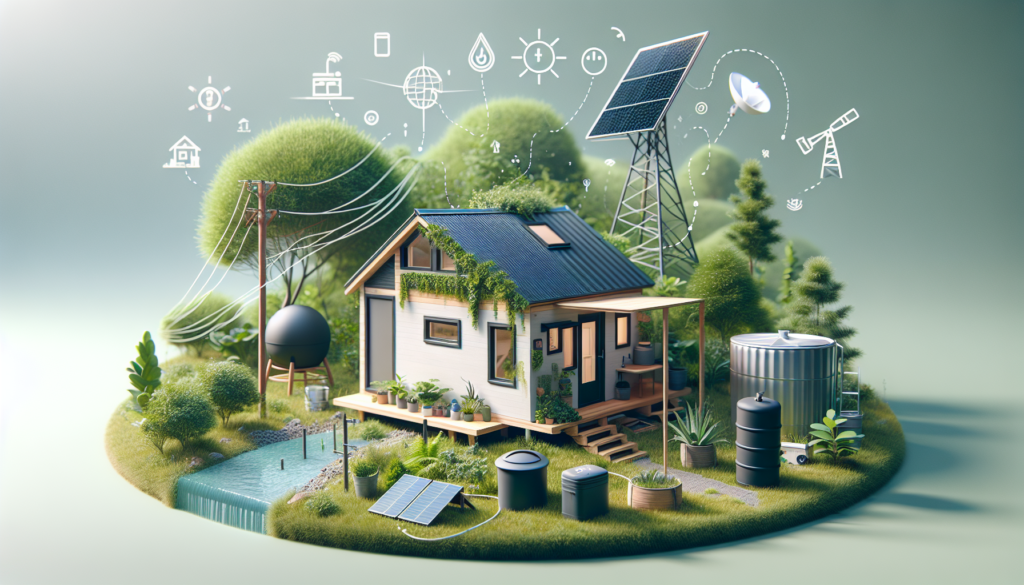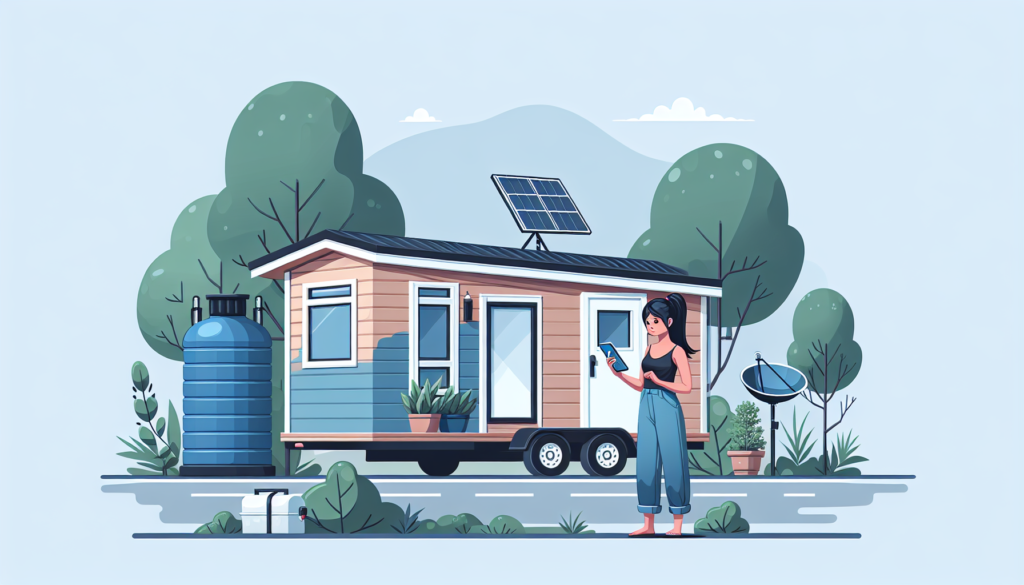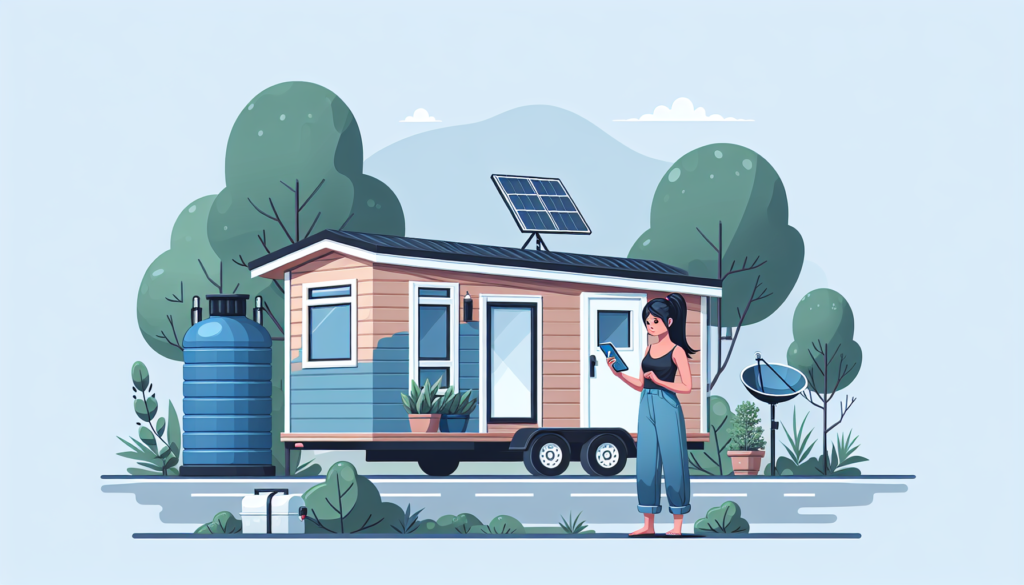Living in a tiny home can be a fulfilling and sustainable lifestyle choice, but it also comes with unique challenges. In order to navigate these challenges successfully, it is essential to be aware of the vast array of community resources available to tiny home owners. From finding affordable parking options to accessing utilities and maintenance services, this article will guide you through the process of finding and utilizing these valuable resources. Discover how to make the most out of your tiny home experience by tapping into the supportive network that exists within the tiny home community.

Local Government Agencies
Planning and Zoning Departments
Local planning and zoning departments play a crucial role in the development and regulation of tiny homes within a community. These departments are responsible for ensuring that construction meets building codes, zoning regulations, and land use requirements. By consulting with your local planning and zoning department, you can obtain valuable information regarding the legality of tiny homes in your area, as well as any specific requirements or permits that may be necessary for tiny home construction or placement.
Building and Safety Departments
Building and safety departments are another important resource for tiny home owners. These departments are responsible for enforcing building codes and ensuring that structures are safe for occupancy. By working closely with your local building and safety department, you can ensure that your tiny home is constructed with all the necessary safety measures in place. They can also provide guidance on obtaining the necessary permits and inspections throughout the construction process.
Housing Departments
Housing departments are a valuable resource for tiny home owners seeking affordable housing options. These departments often have programs in place to assist low-income individuals and families in finding suitable housing, including tiny homes. By contacting your local housing department, you can inquire about any available programs, subsidies, or grants that may help you in your journey to becoming a tiny home owner.
Nonprofit Organizations
Affordable Housing Advocates
Affordable housing advocates are nonprofit organizations dedicated to promoting affordable housing options for individuals and families. These organizations often work with local governments, developers, and community members to advocate for the inclusion of tiny homes as a viable solution to the affordable housing crisis. By reaching out to affordable housing advocates in your area, you can gain support and guidance in navigating the complexities of tiny home ownership.
Community Development Organizations
Community development organizations focus on improving and revitalizing communities through various initiatives, including affordable housing. These organizations often offer resources, funding, and support to individuals interested in building or owning a tiny home. By connecting with community development organizations, you can tap into a network of like-minded individuals and gain access to valuable resources and information.
Habitat for Humanity
Habitat for Humanity is a well-known nonprofit organization that builds and provides affordable housing to families in need. While traditionally known for their single-family homes, Habitat for Humanity has also embraced the concept of tiny homes to address the growing need for affordable housing. By partnering with Habitat for Humanity, you can benefit from their expertise, resources, and community support in realizing your dream of owning a tiny home.
Financial Assistance Programs
Grants and Loans for Tiny Home Construction
Various grants and loans are available to help individuals finance the construction or purchase of a tiny home. These financial assistance programs can provide funding for materials, labor, or even land acquisition. By researching and applying for these programs, you can lessen the financial burden associated with tiny home ownership and make your dream more achievable.
Low-Income Assistance Programs
If you are a low-income individual or family, there may be assistance programs available specifically designed to help you secure affordable housing, including tiny homes. These programs can offer financial support, rental subsidies, or access to affordable housing developments. By exploring these low-income assistance programs, you can find the support you need to make tiny home living a reality.
Energy Efficiency Rebates
Many governments and utility companies offer energy efficiency rebates to encourage environmentally-friendly practices, including the construction and maintenance of energy-efficient tiny homes. These rebates can help offset the costs of energy-saving appliances, solar panels, insulation, and other energy-efficient features. By researching and taking advantage of these rebates, you can not only reduce your carbon footprint but also save money in the long run.
Environmental Sustainability Resources
Renewable Energy Incentives
Utilizing renewable energy sources is a popular choice among tiny home owners who are passionate about sustainability. Various incentives, such as tax credits and grants, are available to support the installation of renewable energy systems, such as solar panels or wind turbines. By tapping into these incentives, you can power your tiny home with clean energy and contribute to a greener future.
Water Conservation Programs
Tiny home living often involves limited water resources, making water conservation a priority. Many local governments offer water conservation programs that provide resources, education, and incentives to help residents reduce their water usage. These programs may include rainwater harvesting systems, low-flow fixtures, and water-efficient landscaping. By participating in water conservation programs, you can minimize your environmental impact and save money on water bills.
Waste Management Services
Proper waste management is crucial for tiny home owners. Local governments typically provide waste management services that include trash collection, recycling programs, and composting options. By utilizing these services, you can ensure that your waste is properly disposed of and recycled, minimizing your ecological footprint. Additionally, some communities offer education and resources on reducing waste and adopting a zero-waste lifestyle.

Legal Support and Advocacy
Tiny Home Legalization Groups
Tiny home legalization groups advocate for changes in local building codes and zoning regulations to accommodate tiny homes. These groups work to raise awareness, provide legal support, and rally for policy changes that make tiny home living a viable option. By engaging with these groups, you can join forces with other tiny home owners and advocates to promote positive legislative changes in your community.
Tenant Rights Organizations
As a tiny home owner, it is important to understand your rights as a tenant. Tenant rights organizations provide resources, education, and legal support to help you navigate landlord-tenant relationships, lease agreements, and eviction laws. By connecting with tenant rights organizations, you can ensure that your rights as a tiny home owner are protected and that you have the necessary knowledge to advocate for yourself in any legal matters.
Public Interest Law Firms
Public interest law firms often specialize in housing and property rights issues, making them valuable allies for tiny home owners. These firms can provide legal guidance, representation, and advocacy on issues related to zoning, permitting, and other legal matters that may arise during your tiny home journey. By seeking assistance from public interest law firms, you can ensure that your rights are protected and that you have the legal expertise necessary to navigate any legal challenges.
Educational Workshops and Events
Tiny Home Building Workshops
Attending tiny home building workshops is an excellent way to gain hands-on knowledge and skills necessary for constructing your own tiny home. These workshops are typically led by experienced builders and cover a wide range of topics, including design, construction techniques, and sustainable practices. By participating in these workshops, you can learn from experts in the field and gain the confidence to tackle your own tiny home build.
Community Gatherings and Meetups
Joining community gatherings and meetups specifically tailored for tiny home owners is a fantastic way to connect with like-minded individuals and build a network of support. These events often feature guest speakers, discussions, and opportunities to share experiences and knowledge. By attending these gatherings, you can learn from the experiences of others, find inspiration, and establish meaningful relationships with fellow tiny home enthusiasts.
Sustainability Seminars
Sustainability seminars provide education and insights into sustainable living practices, which are highly relevant to the tiny home community. These seminars cover topics such as renewable energy, water conservation, waste reduction, and permaculture. By attending sustainability seminars, you can deepen your understanding of sustainable living principles and incorporate them into your own tiny home lifestyle.
Online Communities and Forums
Tiny Home Owner Facebook Groups
Participating in tiny home owner Facebook groups allows you to connect with a vast community of fellow tiny home enthusiasts from all over the world. These groups serve as platforms for sharing ideas, asking questions, troubleshooting issues, and seeking advice from experienced tiny home owners. By joining these online communities, you can tap into a wealth of knowledge, connect with like-minded individuals, and feel a sense of belonging within the tiny home community.
Online Forums and Discussion Boards
Online forums and discussion boards dedicated to tiny home living are valuable resources for obtaining information and engaging in conversations about various aspects of tiny home ownership. These platforms provide opportunities to ask questions, share experiences, and learn from others who have already navigated the challenges of tiny home living. By actively participating in these online communities, you can expand your knowledge and foster meaningful connections with individuals who share your passion for tiny homes.
Social Media Tiny Home Communities
Social media platforms such as Instagram, Twitter, and Pinterest host a thriving community of tiny home enthusiasts. By following relevant hashtags and accounts, you can gain inspiration, access helpful resources, and connect with a diverse range of content creators, builders, and tiny home advocates. These social media communities offer a visually captivating way to stay up-to-date with the latest trends, innovations, and stories within the tiny home world.
Tiny Home Insurance Providers
Insurance Companies Specializing in Tiny Homes
Obtaining insurance coverage for your tiny home is essential to protect your investment. Insurance companies specializing in tiny homes understand the unique nature of these dwellings and can provide tailored coverage options. By researching and selecting insurance companies experienced in insuring tiny homes, you can ensure that your property and belongings are protected from unforeseen events.
Coverage Options and Requirements
Tiny home insurance providers offer various coverage options tailored to the needs of tiny home owners. These options typically include coverage for property damage, theft, liability, and personal possessions. It is important to carefully review the coverage options and requirements to ensure that your specific needs are met and that you have sufficient protection for your tiny home.
Insurance Comparison Tools
To find the best insurance coverage for your tiny home, you can utilize online insurance comparison tools. These tools allow you to input your specific details and compare coverage options, premiums, and deductibles from multiple insurance providers. By using these comparison tools, you can make an informed decision and secure the insurance coverage that best suits your needs and budget.
Home Improvement and Maintenance Services
Contractors and Builders
When it comes to building, renovating, or maintaining your tiny home, hiring experienced contractors and builders is essential. These professionals have the necessary knowledge and skills to ensure that your tiny home is constructed or maintained to the highest standards. By working with reputable contractors and builders, you can trust that your tiny home will be safe, functional, and built to last.
Plumbing and Electrical Services
Plumbing and electrical services are crucial for the proper functioning of your tiny home. Hiring licensed plumbers and electricians ensures that your plumbing and electrical systems comply with safety standards and building codes. These professionals can provide installation, repairs, and maintenance to ensure that your tiny home has reliable access to water and electricity.
Tiny Home Repair Specialists
Tiny home repair specialists are professionals who specialize in addressing the unique maintenance and repair needs of tiny homes. These specialists have experience in working with the specific challenges and intricacies of tiny home construction and can provide efficient and effective repairs when issues arise. By relying on the expertise of tiny home repair specialists, you can ensure that your tiny home remains in optimal condition and enjoy peace of mind knowing that potential problems will be addressed promptly.
Tiny Home Parking and Land Options
Tiny Home-Friendly RV Parks
RV parks that welcome tiny homes are an excellent option for individuals seeking a place to park and live in their tiny home. These parks often provide amenities such as hookups for water, electricity, and sewage, as well as communal spaces and recreational facilities. By identifying tiny home-friendly RV parks in your desired area, you can find a community of fellow tiny home owners and enjoy the convenience and camaraderie that comes with living in a community setting.
Land Lease and Rental Opportunities
Leasing or renting land is a popular option for tiny home owners who prefer to have their own land and privacy. Some landowners offer rental opportunities specifically tailored for tiny homes, providing a unique chance to live in a serene and secluded setting while still having access to necessary utilities and services. By exploring land lease and rental opportunities, you can find a slice of land to call your own and create your ideal tiny home lifestyle.
Zoning Regulations and Restrictions
Understanding zoning regulations and restrictions is critical for finding suitable locations to park or place your tiny home. Zoning regulations vary from one jurisdiction to another and may restrict the placement of tiny homes in certain areas. By researching and familiarizing yourself with local zoning regulations and restrictions, you can ensure that you choose a location that allows for the legal parking or placement of your tiny home.

